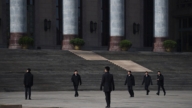【新唐人2014年09月15日讯】过去十年来,中共大量在全球范围内收购原材料,投资矿业。然而很多大规模交易都在亏损。中信泰富耗资百亿对澳大利亚“中澳铁矿”的收购,就是一个明显的例子。“中澳铁矿”项目的成本超过预算三倍,并且在该项目投产的第一个年份:2014年,就可能损失数亿美元。大陆学者指出,中共的海外投资已经成为贪官们“化公为私”,转移资产的绝佳机会。
《华尔街日报》9月11日报导说,中信泰富有限公司收购澳大利亚的铁矿项目“中澳铁矿”,是中国过去十年来,收购原材料策略失败的一个例子。这个项目总投资达100亿美元,耗时已经超过八年。
《华尔街日报》说,中信泰富及其承包商们,在这个项目上犯了一系列的错误,从想当然地认为,可以用国内工资水平向澳大利亚输出工人,到失败的汇兑押注,最终不得不从母公司中信集团请求15亿美元的救助。
过去十年来,中国迅速在全球范围内收购大宗商品资产。去年,中国的境外资源投资飙升到533亿美元,而在2005年只有82亿美元。如此大量的采购,已经产生了无数的不良投资。很多大规模交易都在亏钱、承担意料之外的成本、或是产出远远不及预期。
仅根据官方媒体报导,去年中国矿业协会的负责人估计,总体海外矿业交易有80%都失败了。
《华尔街日报》分析说,中国投资亏本的原因是多方面的。在全球资源热潮中,中国是一个后来者,而且经常为资产支付过高的价钱。摩根大通亚洲油气研究部门的负责人达林说,一般而言,中国会为油气资产支付比行业平均价格高20%的价款。
中国劳动关系学院教授王江松:“海外并购,中国人技术层面不够。人家海外并购都做了上百年了。你中国刚开始。在和外国人打交道的时候,你对当地的政策法律经营管理,各方面的情况,社会环境,经济环境,并不是很了解。贸然的进军海外市场,收购其他的一些资源,可能在经济上不一定算得过人家,在交易上可能会吃亏。”
中国劳动关系学院教授王江松指出,海外投资亏损的另外一个原因是,权贵利益集团通过海外并购这种方式,把国有资产私有化,导致国有资产大量流入私人腰包。
王江松:“它超过预算三倍,这怎么回事?国有企业在海外的并购不受内部工人,也不受社会,也不受立法机构,也不受任何人的监控。那么从道理上推测,这里面可能有一些洗钱的,通过海外并购转移资产的问题。4.09这是一个黑洞。这是毫无疑问的。因为没有监管,没有有效的监管。”
澳大利亚《悉尼时报》总经理、著名时事评论家杨恒均对《新唐人》表示,由于缺乏监管,中共海外投资基本上都是个人发财,国家亏损。
澳大利亚《悉尼时报》总经理杨恒均:“主要原因就是这个制度,贪官, 每个人,包括周永康在外面搞石油。周永康是政法委书记,海外石油很多都是他在垄断。荣智健这些,很多在海外的投资,基本上他们只相信自己的人,海外投资没有中国老百姓主导的。”
杨恒均表示,中共海外投资成为太子党侵吞国有资产,和转移国内资产的一个重要途径。到了海外,山高皇帝远,项目负责人贪不贪污?拿多少回扣?决策有没有科学根据?都是一团乱帐。
9月11号,香港证监会起诉中信泰富原董事长荣智健等五名前董事,谎报公司财务状况,造成股票投资者损失。证监会要求他们,向4500名总共斥资19亿元的投资者赔偿,并要求法庭制裁五人。而荣智健,是前国家副主席荣毅仁的儿子。
采访编辑/秦雪 后制/肖颜
Failure—80% of China's Overseas Mining Deals Lose
Over the past decade, the Chinese Communist Party (CCP)
has invested heavily in raw materials overseas,
but the majority of its trading is losing money.
CITIC Pacific invested $10 billion on its Sino Iron project,
purchasing an Australian mine producing magnetite iron-ore.
Despite costing four-times its initial budget, it may lose
hundreds-of-millions of dollars in 2014—after only one year.
Experts say the CCP's overseas investments give corrupt
officials a perfect opportunity to 'privatize' national assets.
The Wall Street Journal (WSJ) says the $10-billion mine
that's taken over eight years to develop in Cape Preston
is evidence of just how much has gone wrong with China’s
decade-long push to buy up raw materials worldwide.
Citic Pacific and its contractors made a series of blunders,
from thinking they could import workers at Chinese pay levels
to a botched bet on currencies that forced the company
to seek a $1.5 billion bailout from its parent, reported WSJ.
WSJ added, China rushed to buy up global commodities as
its economy boomed—both to feed its factories and to ensure
it wasn’t reliant on Western powers for raw materials.
…Investments in resources soared to $53.3 billion last year,
from $8.2 billion in 2005, according to an investment
database compiled by the American Enterprise Institute
and the Heritage Foundation, continued WSJ.
The head of China’s mining association estimated in 2013
that out of all overseas mining deals, 80% had failed.
China came late to the global resources boom and often
overpaid for assets Western companies had passed over
or wanted to sell, says WSJ, adding; China typically paid
one-fifth more for oil-and-gas assets than industry average,
estimates Scott Darling, Asian regional head of
oil-and-gas research at J.P. Morgan Chase & Co.
Prof. Wang Jiangsong, China Institute of Industrial Relations:
“China lacks technique in overseas mergers and acquisitions."
"The West have been doing overseas mergers
for hundreds of years, but China has just started;
it lacks information on the local policy, laws, management
and in social and economic aspects."
"Rushing into foreign markets and into acquisitions
could turn into a financial disadvantage."
Prof. Wang says another reason for overseas investment loss
is the privatization of state-owned assets by the political elite.
Wang Jiangsong: “How did this budget that was
more than three-times the initial amount come to be?"
"The overseas acquisitions by state-owned enterprises
are not subject to any supervision, like by internal workers,
the society, or by legislative bodies."
"So theoretically, money laundering through overseas
acquisitions is possible; it's a black hole for sure,
as it lacks supervision or any effective regulations."
Commentator Yang Hengjun says the CCP's investment has,
due to lack of supervision, allowed individuals to gain wealth
at the cost of national assets.
Yang Hengjun, general manager, Sydney Times:
“The main reason is the system and the corrupt officials;
everyone, including Zhou Yongkang and his oil group,
monopolizes overseas oil investments."
"Larry Yung, the former chairman of CITIC Pacific,
was one of his allies; they trust only their own people."
"The numerous overseas investments
have never been led by the Chinese people."
Larry Yung is the son of China's
former Vice President, Rong Yiren.
The CCP's overseas investments are one primary way
for princelings to embezzle state assets, says Yang Hengjun.
The project leaders are all corrupt, and being overseas,
no one can control them; the accounting is just a mess.
Sept. 11—the Hong Kong Securities and Futures Commission
(SFC) filed a lawsuit against five former CITIC Pacific chiefs
—including Larry Yung—for lying about the company’s
financial state, which resulted in a loss by equity investors.
The Commission sought compensation for 4,500 victims
who had lost a combined total of $1.9 billion in investments.
Interview & Edit/QinXue Post-Production/XiaoYan

























